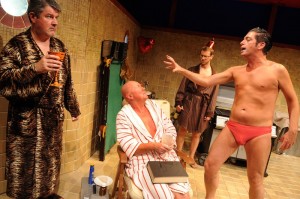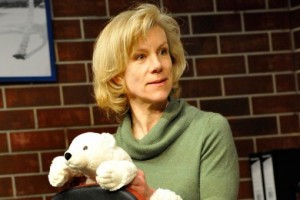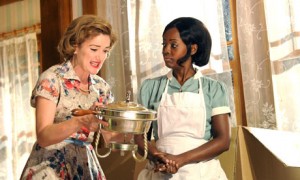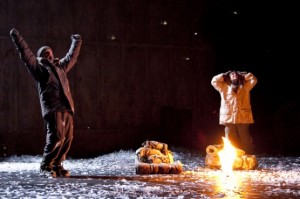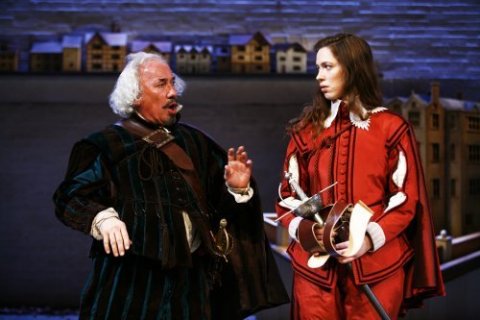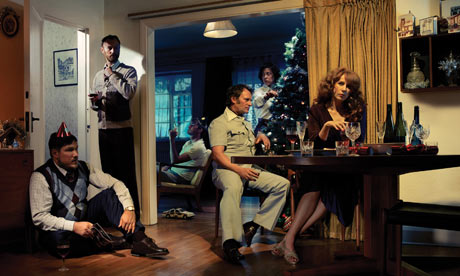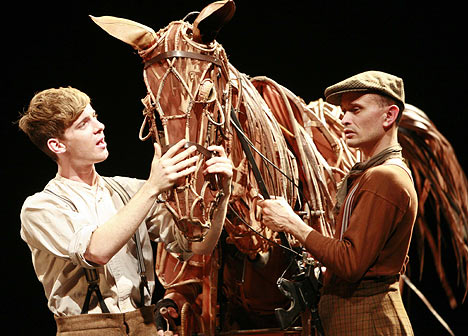Theater Review Roundup: Taking in London Stages
Reviews of eight stage productions in London, with two terrific shows noted: American dramatist Bruce Norris’s powerful study of racial relations, Clybourne Park, and Alan Ayckbourn’s 1980 farce Season’s Greetings. Another winner on the West End, the critically acclaimed War Horse, comes to New York next week.
By Joann Green Breuer
- Penelope by Enda Walsh
- The Heretic by Richard Bean
- Clybourne Park by Bruce Norris
- Becky Shaw by Gina Gionfriddo
- Greenland by Moira Buffini, Matt Charman, Penelope Skinner, and Jack Thorne
- Twelfth Night, or What You Will by William Shakespeare
- Season’s Greetings by Alan Acykbourn
- War Horse, based on a novel by Michael Morpurgo, adapted by Nick Stafford
A Few Observations
American theater has plenty of British fans. Two imports are commented on below in this roundup of London stage productions. Last week, Stephen Sondheim was given the Olivier Special Award 2011. In Camden town, Jewish Book Week focused on Christopher Bigsby’s highly regarded, new biography, Arthur Miller. After the Fall, Miller’s 1965 play, though critically dismissed in the USA, was lauded in Great Britain and serves as the catalyst for Bigsby’s long affection for Miller and his work.
What this loving biography loses in objectivity of assessment, it compensates for in documentation of political and personal details, revealing more than Miller’s carefully limned autobiography Time Bends. Unacknowledged Jewishness in Miller’s drama continues to be debated, but Bigsby makes clear that Miller’s dedication to human rights (despite his silence on his retarded son) has been open and daring.
London fringe productions, on and off stage, fuse political issues and economic problems. Notable is a play from the Netherwood day Centre, a specialist unit for persons with dementia, now facing closure due to spending cuts. Janet Westgarden, producer of An Evening with Dementia, prized at the Edinburgh Fringe festival last season and now at the West End Theatre, is on street corners, with her creative team in character, soliciting signatures for a petition to keep the Centre open.
Some names to watch for which may not appear in theater advertisements are Toby Sedgwick, movement director, and Kate Waters, fight director. The latter is the first and one of two female accredited fight directors. Whenever they move actors in space, the stage world is alive, no matter the text. Movement can make the text matter.
The Productions
Reviews of four plays originating off West End (equivalent of off Broadway) and five plays originating at the National Theatre (no American equivalent).
Penelope by Enda Walsh. Directed by Mikel Murfi. Staged by Ireland’s Druid Theatre at the Hampstead Theatre.
We are at the bottom of a drained swimming pool with four men in bathing attire, three of them robed. Long silence. Then, they make up for lack of clothing in volume. The acoustics in their home base cannot possibly be so poor that shouting is the only option. It is hard to listen for the noise. A pity. Walsh has a way with word play and an occasional pithy phrase worth parsing.
This play won first prize at the Edinburgh Fringe Festival, and his reputation for many plays in Ireland, particularly at the Druid of which he is a founder, is, so far, secure. His breakout play, Disco Pigs, was subsequently made into a film, and he co-wrote the Cannes d’Or award winner Hunger.
The four men in the dry pool are suitors for the mythic Penelope as she awaits her Odysseus. We, and they, know the wait is futile, but there may be no exit, save death. They plead via television for the attention and love of Penelope, mute, seated back to the audience. Their speeches reveal a bit of Walsh’s talent. “Time’s a tragedy,” says one, as “the body and the mind part company.” It is impossible to distinguish “the half wit (from) the revolutionary.”
Unfortunately, the production belies the possibilities of the premise. The point of view of the suitors could have been a lesson of, if not in, futility. This is a futile competition, as so many are. The “fat man in Speedos,” as one suitor terms himself, is neither pitiable nor personable. When his competitor for the lady sneers that his “breath would peel a hard boiled egg,” we suppose it would. An excuse not to get any closer. We might damage our eardrums and our desire for more theater.
The staging for the most part consists of three men moving out of the way while the fourth moves center for his speech. This is not meaningful, not natural. It is merely convenient.
At the point when pretension and pretend tension can go no further, there is an odd interlude of a super-fast change dumb show. A series of historical figures, from Napoleon to Kennedy, all played by one, outrageously over and under costumed suitor, emerge in garb and wig after garb and wig. It is a weird sequence, but because it is so over the top, cleverly amusing. As anticlimax, predictably, the following few minutes are filled with cliché talk of trust and friendship. “Life is lived by looking and being,” explains one suitor, as incomplete a philosophy as the play’s.
Near the close of Penelope, a tedious hour and a half since it began, Penelope herself makes a brief and unfortunate partial descent to the pool. She is a graceless performer, an uncomfortable presence. The perfection of her attraction would have been better served by our imaginations. “Only love (…. many other nouns…) can save us,” concludes one character. Yes, that and the curtain.
Note: coming next to Hampstead Theatre is Mike Leigh’s Ecstacy, a promising choice.
The Heretic by Richard Bean. Directed by Jeremy Herrin. At the Royal Court Theatre.
Rumor has it that when Richard Bean attended the Royal National Theatre’s disastrous play on climate change, Greenland, he was unable to resist a smirk or three. To some degree, Heretic is indeed its antidote. Central to the Bean’s text is a counter-intuitive argument that is shaped to challenge a liberal community: the science professor does not accept global warming as a fact, let alone a human effect. And she has a tree to prove it. In actress Juliet Stevenson’s capable art, this heresy induces curiosity in the agnostic and skepticism in the believer. Her heresy gets her into considerable academic trouble, while the script, rather facilely, eventually gets her out of it.
A sub plot, family squabbling, keeps the play at or just above sitcom level, with one liners to induce the occasional smile or squirm. Mother to anorexic daughter:
“I need to eat. You need to eat and throw up.” Lydia Wilson, as the scientist’s daughter, explains to her own satisfaction why this habit is not bulimia.
The dual stories do not merge or complement each other. They remain disparate, parallel, but each irrelevant to the other. Perhaps that is how life is, but art demands more connection than life. Both plot lines intimate horrific endings, and both end well. Yet another nod to the safe sell.
Clever academic repartee enlivens the arguments between professor and her superior (pun intended) in the university pecking order (James Fleet), an expert on anthropogenic temperature and water risings. “I don’t believe in anything. I am a scientist,” says heretic Diane (Stevenson). It is unclear what he believes, or if he is “manipulated by funders’ views.” Touché. One can believe she and he were once lovers and good scientists and trust that their trysts are over and their science in question.
Wilson is required by the text to be annoyingly too old to behave so adolescent. Luckily, she is able to alternate as an oddly touching, if superannuated, in her attraction to the lonely, grunge, green-activist student (Johnny Flynn) who aches for the affections of both mother/mentor and her daughter. Flynn handles the role of awkward, guitarist lover with such sweet sincerity that any conventional mocking would be inhumane.
Puppetry is present in Heretic as it is in several other of this season’s London offerings. Stevenson manipulates a miniature polar bear with earnest delight. Her comic sensibility is definitely laugh inducing, a pleasure to watch, even as she sticks to her gumption. Stevenson is petite but makes the most of every inch.
“The shield of science and the sword of skepticism” are put to the test by death threats (from earth savers) and threat of death (from starvation). Despite knives nicked and fists flying, all danger is aborted. We suspected it would be when zingers fly: “I need a drink. I’ve had a bad 10 years” and “Maybe Arabic is Allah’s second language.” “What’s his first?” “Hebrew.”
Clybourne Park by Bruce Norris. Directed by Dominic Cooke. Staged by the Royal Court Theatre at Wyndham’s Theatre.
Tom Stoppard took two minor characters in Hamlet and made a play of them. Geraldine Brooks took the father of Little Woman and made a novel about him. With Clybourne Park, dramatist Bruce Norris takes the white family of A Raisin in the Sun and makes with them a drama as noble and as daring a reflection of and on Hansberry’s iconic tale as one would wish created. Such a creation might have been unimaginable, but after seeing Norris’s work, it feels ineluctable. Bravo.
Norris, Texan born, now lives in New York City, where one hopes he continues to write. His plays have been produced by the Steppenwolf and Lookingglass theatres in Chicago, Philadelphia Theatre Company, and Wooly Mammoth in D.C., among others. He has received the Steinberg award and the Whiting Foundation Prize, also among others.
Director Dominic Cooke is the Artistic Director of the Royal Court, where he has staged many plays from Shakespeare to Ionesco and beyond. He is also an opera director. Penny Dyer is the admirable dialect coach for this British cast, whose American accents are consistently accurate. A commendation also goes to the ASL coach, English Sign Language being a different linguistic system.
Act One, 1959, post the Korean war, in suburban U.S.A. Unspoken, unspeakable pain infects the couple, Russ (Stuart McQuarrie) and Bev (Sophie Thompson), as they banter belligerently about city names and chores, getting dressed and getting going. There is humor here, but it feels hard and horrid. The small living room is almost empty of furniture, only an armchair, a lamp, a small chair with a carton on it, and more packing cartons, filled, one assumes, with household goods. Francine, the colored maid (Lorna Brown), will definitely not accept the gift of a little used casserole dish. The pressure mounts. What seemed pettily amusing becomes a persistent strain.
Gradually the plot reveals itself as neighbors, a minister (Sam Spruell), a friend (Stephen Campbell Moore), his deaf, pregnant wife (Sarah Goldberg), and Francine’s husband (Lucian Msamati) enter the small living room.
A Black family has bought the house, the first Black family of the neighborhood. Racism pursues its ugly logic, the language of the characters lifts to desperate incoherence, the passions are raw, the stage crackles with asymmetric rhythms of what we know of race and war and wish we did not know. A crescendo of directorial, acting, and structurally theatrical honed magic. Then, a longing quiet, as tears fall with the curtain.
Act Two, 50 years later, the rhythmic pattern echoes and enlightens the metrics of Act One: seemingly trivial tensions build to bitterly honest conflicts and finally release. The exceptional cast doubles roles from act to act. The choice of doubling has its reasons, as everything Cooke does in this production.
Opening the second act, he dares to leave the cast seated in chairs, reading and parsing obscure real estate regulations. Cooke trusts the flow of emotions to generate movement until it becomes absolutely necessary for someone, then another and another, to rise and rage. His trust is justified. The heart hurts and does not ever heal. Effects of armed battles abroad and turf battles at home are etched and unresolvable. Clybourne Park has life and afterlife.
Advertised as satire or comedy, Clybourne Park is neither. It does what theatre is supposed to do but rarely does. It obeys Pascal demands, “to reveal ourselves to ourselves.” The view isn’t always pretty, but it makes for necessary art.
Becky Shaw by Gina Gionfriddo. Directed by Peter DuBois. Staged by the Huntington Theatre Company at Almeida Theatre.
The playwright and director were colleagues and friends as students at Brown University, where their class (academic) connections led eventually to Becky Shaw, a play about class (social) discrimination, with a bow to Thackeray’s Becky Sharp and to Professor/playwright Paula Vogel’s blackly comic feminism. Becky Shaw, however, is their lesser offspring. Perhaps this play’s American reputation and the British residue of royal/commoner distinction and discomfort were the magnet drawing this slight, if at times amiable, domestic conflict in two acts across the pond.
No question the British audience found humo(u)r where this American reviewer found ho-hum.
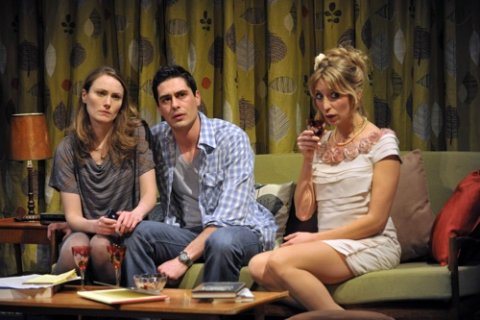
Anna Madeley, Vincent Montuel and Daisy Haggard in the London production of BECKY SHAW. Photo: Hugo Glendinning
The small stage is a revolve, each set full with minimum furnishings, often a bed, leaving little space for staging. The staging, like the play, frequently moves in circles. As compensation, DuBois provides packaged snacks. Hand to mouth is the prominent movement for Max (David Wilson Barnes), the sturdy, passionless, adopted son whose thoroughly American (which he is) characterization keeps the show afloat. Better to chew sweets than scenery. His arguments may be as distasteful as his caloric choices, but they do nourish this bland comedy. Max is determined to save every family penny, and with that David manages to save every fitful scene.
Becky (Daisy Haggard) herself enters late in the action, as it were. Meanwhile, financial security, a seemingly incompatible, instant marriage, unfulfilled aspirations, and a disabled, interfering mother are the ping and pong of dialogue.
Haggard presents a forceful presence, definitely an Other, with the wise faux pas at the tip of her brash, bass tongue. Her determination does not falter. Soon enough the laughs at her turn into laughs with her, but even that does not suffice to give weight to her wit.
Ultimately, it is the Mother (Haydn Gwynne) whose final entrance, off balance with MS, unsentimental, cutting the air with her crutch and the assumptions with reality, who gives spine to the wobbly relations. With a strong resemblance to Amy Aquino, in style and figure, Gwynne is believable as American mother-icon, winning the last tough word. She cuts to the core, cruel only to be kind, which she kind of is. Her no frills attached, no excuses attitude shines in contrast to her daughter’s resentful, relentless dependency.
Becky Shaw offers a conventional, domestic comic collection: the will-it-work marriage, the nasty stepmother, the temptress, the rational problem solver.
The plot twists a bit but never out of shape. We are left to our own predictions. All are arguably justifiable, as any ethical or moral stand, let alone couples’ futures, are as unsteady as the Mother’s legs.
Note: There is no American National Theatre. Peter Sellars tried at least calling his such at the Kennedy Center in D.C. in the 1980’s. It lasted one season, with limited commercial, artistic, or political (i.e. funding) success. The Kennedy Center was built for touring theatrical events, not for original productions, and Sellars’s personal vision was not, it seems, a national one.
Director Bill Rauch took another tack with Cornerstone Theater a year later, using a variety of communities in collaboration with professional teams as emblematic of what is American. His theater, inspired in part by Hallie Flanagan’s Depression Era accomplishments, has lasted considerably longer, 20 years and counting, even after his departure. The communities, varying in geography, age, and ethnicity, with which it works and has worked are consciously altered by and continuously grateful for the experience. But it is doubtful if most Americans have heard of Cornerstone, let alone feel connected or responsible to it.
The concrete behemoth on the South Bank of the Thames is a monument of pride to the English in the way American theater has never been. Pride translates into consistent public and private funding. London is a center of work for movies and television roles, as well as live theater. Actors, directors, and designers can reside in one city to find work. No Hollywood/New York competition there. And no theater artist or audience can forget where Shakespeare’s muse sang, and there continually attempt to create and hear her harmonious echoes. ( I will comment on Danny Boyle’s production of Frankenstein, as seen live and HD following its March 17 showing at the Coolidge Corner Theatre.)
Greenland by Moira Buffini, Matt Charman, Penelope Skinner, and Jack Thorne. Directed by Bijan Sheibani.
A young woman flying above the stage deck curled in a shopping basket might make for an intriguing image, were there any reason for her wired flight or even were it a pretty picture. It is neither, nor is anything below her of dramatic or intellectual interest. The only excuse is if one is not prepared to fail from time to time, one has probably not reached far enough.
With Greenland‘s four playwrights, not one of which alone can be entirely blamed for these dismal hours; the reach of the NT has no play, no character, no language on which to grasp. There is some energy in interludes, as Sheibani whips up the cast in dance-like movement of no relation to the previous or subsequent scenes. The empty frenzy does take up time, fill the stage, and give some impression of energy, energy being the theme of this didactic diatribe on climate change. Shelibani is proof that well meaning is not necessarily well done, although the director may be given credit for moving a lot of folks off, on, and around the stage without their bumping into one another.
A narrator tries too hard to be engaging, a lesbian couple explain the obvious (they disagree), a young man finds an old mentor in arctic fur, and that overhead young woman has mommy troubles. Four thin-to-evaporation situations, so-called plots, are deposited on a barren stage, while occasionally silhouette projections of birds fly around the up stage wall and audience, the former perhaps hoping for their predicted extinction. For us, no interval, no escape. Snow falls, a campfire burns, one character does not make it to the exit pursued by a (polar) bear, cloth-as-blood drapes the deck. Lecture, one of many, to follow.
The program is filled with explanations of terms passing as dialogue: Albedo, CFS, chaos theory, hockey stick graph, Stern Review, biluminous sands.
Also in the thick program is a charmingly illustrated time line of environmental protocol efforts that provides discouragingly enlightening reading while nothing is happening on stage. One can only hope that the future of the planet is not the exercise in futility that this production, an extreme illustration of the impotence of being earnest, presents.
Twelfth Night, or What You Will by William Shakespeare. Directed by Peter Hall.
At the age of 80, Peter Hall, founding Artistic Director of the Royal Shakespeare Theatre, and for15 years Artistic Director of the National Theatre has returned to the NT to stage Shakespeare’s bitter, anguished comedy, Twelfth Night, braving calls of nepotism by casting his daughter, Rebecca Hall, as the gender deceptive wash-ashore Viola/Cesario.
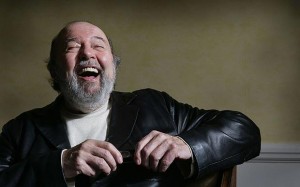
Sir Peter Hall turns 80 this year and celebrates by directing a production of TWELFTH NIGHT at the National Theatre
The Cottesloe, smallest of the National’s three stages, provides intimacy to the scene. Visual forced perspective of the space, later a frieze of miniature town’s houses and castle, hints that all is not quite what meets the eye. Hall provides his usual utmost clarity to the speech. He knows whereof he directs. Each moment seems complete, yet there is ample room and mood shifts in the careful pacing for nuance, for clues as to what lies beneath the cakes and ale, the pride, the pun, the pearl, and the perspective.
Orsino (Marton Csokas), duke in love with love, or, more likely, in love with wanting to be in love, lies draped in damask, inappropriate fabric for this macho master, rudely demanding music that cannot satisfy him. He stops the music and flings off the brocade. His arrogance is cover enough for a while, yet when true loves comes to serve him, his vulnerability has no wherewithal to hide this strange-to-him desire.
Olivia (Amanda Drew), elegant and touching in mourning black, will have none of him. Her feminine delicacy has determination and underlying sorrow. She should be loved, not only to assuage her loneliness. She joins the mocking of Malvolio but with a touch of regret.
In the tavern, a mere wooden table, a bench, Sir Toby Belch (Simon Callow) and Sir Andrew Aguecheek (Charles Edwards) behave badly, forcing farce from alcohol and idleness. Toby is loud, pushy, fomenting pranks, smiling in the face of grief, while Andrew, lanky, loyal companion, attempts to please and share the pleasure, real or false. His incompetence is tender tribute to friendship and hilarious, painful, a beautifully long-limb-articulated characterization.
Malvolio (Simon Paisley Day) seems seven feet tall, skeletal of skull, cemented in self regard and rectitude. To bend him is to break him, which will be his unforgiving fate.
He is, surprisingly, not afraid of humor. His pause after ‘to be,’ as if he has read Hamlet, is but one of his shared inside jokes, humanizing him and putting into question our too ready judgment of him. We want to strip him of his yellow garters, even as we scoff at him.
Feste (David Ryall) is an old, not foolish, fool. His palm is open for coin, his throat burnished for sad songs of mortality. He knows when he is unnecessarily cruel, but such knowledge does not deter him. That, not wit, is the essence of his foolishness and his moral failing. Hall thinks Feste may be a monk manqué, but we rarely find precise cause to justify inhumanity. Youth, the old man sings, does not endure, his melodic melancholy the sting and solace of this Illyria.
Antonio (James Clyde) is honest, gay, and tough, in lust with, but not abusing, Sebastian (Ben Mansfield), handsome, feared drowned, twin brother to Viola.
When Antonio calls Sebastian by name that one word is fraught with love rejected.
So far, so very, very good. Familiar phrases are at once familiar and fresh. What is said by the above seems truth, Shakespeare spoken, like the set, unadorned and understood. The list leaves Viola the only curiosity as to acting merit among this formidable cast, under the guidance of this esteemed, erudite director, so experienced in creating theatrical excellence.
Rebecca Hall’s Viola is definitely alien to Illyria. She has natural talent but insufficient technique and postural precision. Her presence feels as much from another century, this one, as from another country. Her casual, if clear, speech is inflected with modern lilts and informality. She grins and tilts her head forward, undercutting intensity. When she asks if Orsino is a bachelor at her first steps in Illyria, one questions the depth of her grief at her brother’s presumed death, making the whole of her character more shallow, less sincere.
Her style certainly can work in the guise of Cesario were one to make light of the circumstances of her disguise. Her relaxed, almost playfully confounded impersonation may be exactly the Viola the twenty-first century calls for, as many critics have claimed. Shakespeare’s creatures are continually reinterpreted. But I don’t buy, or want to buy, this one.
I want to believe that Viola’s grief is as profound as Olivia’s, and that Viola’s love for Orsino is in spite of loss, not in compensation for loss. Stunningly, Viola’s final recognition that her twin lives is chilling. Does this stirring moment belie her foregoing off-handedness? Perhaps. But it’s asking an awful lot.
At the close of Feste’s final prophetic song, he rises and leaves the stage. I would that Hall had left him there. But then again, and again, loss is at the heart of the poem and of the play.
Season’s Greetings by Alan Acykbourn. Directed by Marianne Elliott.
Season’s Greetings first greeted audiences in Scarborough, Alan Ayckbourn’s theatre home, in 1980. It has lost none of its wit, none of its pangs and pain.
The signs of datedness are charming: holes in the telephone dial are too small for one character’s fingers, the Christmas music is on a tape recorder, and the toys are repairable. The farce itself is of this moment, as are the unfulfilled bonds of family. Hilarity and heartache wind about each other like layers of the nautilus in gilded ratio. We know this will be farce: 12 doors, two staircases, a few steps, the better to trip over.
But something is amiss. The front of the house seems earthquaked off. The proscenium edge devised as the house walls exposes insulation within, and attic floor/salon ceiling rim bares its supporting struts. This abode has exploded. Recumbent Uncle has weapons up is sleeve and down his socks. Stanislavski warned us. We await the next tragic-comical catastrophe with a shiver and a grin. It arrives, and arrives again, over the top, under the gun, between the lady’s legs, before we know it. It really does hurt to laugh.
Director Elliott has devised a puppet show disaster to make the most jaded adult cringe in empathy. The three little pigs have never before blown us away so thoroughly. Kate Waters has actors crumble in sexual consummation with torso twisting awkward agility, all giggles, guffaws, gasps, and gumption. The plot is preposterous, the panic elaborate. Everything is taken to farcical extreme, to the edge of dangerous cruelty. Significant bruises color the comedy. No one recovers completely. Such human insecurity feels real, right, and unnerving.
Into this eccentric family home at holiday time enters the handsome naïve, seemingly normal, stranger. A writer of a painfully witty, or wittily painful novel, he may be Ayckbourn’s image of himself at his most wishful thinking and wistful resignation. But Ayckbourn has actually written 75 plays and counting. How he does it is anybody’s guess and everyone’s good fortune.
Elliott has assembled a dream of a cast for this comic nightmare. Every performer endows the purportedly stereotypical characters with inventive individuality, takes the situations seriously, and wins us, if not their will. Special mention must be accorded Deborah Winckles, standing in for an ailing Catherine Tate as Belinda, wife and ultimately wench of the household. With mellifluous voice, and petite birdlike stature, she is all too easily, literally, and lustfully swept from her feet and across the floor by the novelist (Oliver Chris), who cracks us up simply by being all that he is cracked up to be. An extra round of applause from the cast as they turned to clap for Winckles at the curtain call was with genuine and merited enthusiasm.
War Horse. Based on a novel by Michael Morpurgo. Adapted by Nick Stafford. Directed by Marianne Elliott and Tom Morris. Puppetry Directors, Basil Jones and Adrian Kohler. Director of Movement and Horse Choreography, Toby Sedgwick. Fight Director, Kate Waters. Imported from the National Theatre presented in association with the Handspring Puppet Company at The New London Theatre.
Credits must be given, and every admiring critic of War Horse is right. The life-sized, abstracted puppets are alive while they live. The horror of their death is palpable, and, as long as war is fought, a potent probability. It says a sad something about humanity when we can read our morning paper’s report of hundreds dead in natural and unnatural disasters and still digest our corn flakes, but the death of one horse puppet stills our appetite for the sweets we just purchased in the lobby. If ever there was a lesson in the lesson of theater, this is it. Theater can teach us to care and to honor even that we paid to care.
War Horse is at base a children’s story, so we know there will be no tragic end to our young hero and his horse. The adolescent boy, the untamed foal, their bonding, the charm and financial struggle of the farm, the wounds and weariness of war, the haltered halting homecoming, are conventional fare, fictional nourishment for moral growth. It is the horror of the journey of boy to man, to wider, worse world, in search of his beloved Joey, animal partner, which is magical, matters, and for the mature. It is the manipulation of the puppet horses that is the optical illusion and moral mentor of the experience, an exposed mystery, all the more mysterious for its exposure.
As in the arts of Bunraku, three puppeteers are visible, here at the side of the head, and within the body of the life-sized horses. Trained in dance and mime, the two legged creatures become irrelevantly distinguishable from the four legged ones. Ruth Rogers, never mind the device with which she moves it, is Joey’s head and, therewith, mood. As for the rearward riggers, well, their artful task takes the punch from the old punch line, “What??! And leave show business!” and leaves us breathless.
The National Theatre production of War Horse opens at New York’s Vivian Beaumont Theater on March 17th for previews, with opening night scheduled for April 14.
Tagged: Alan Ayckbourn, An Evening with Demensia, Becky Shaw, Bruce Norris, Clybourne Park, Druid Theatre, Gina Gionfriddo, Greenland, Huntington-Theatre-Company, Juliet Stevenson, London Stage, National-Theatre, Penelope, Peter Hall, Peter-DuBois, Rebecca Hall, Richard Bean, Royal Court Theatre, Season's Greetings, The Heretic, Twelfth Night, War Horse, West End


